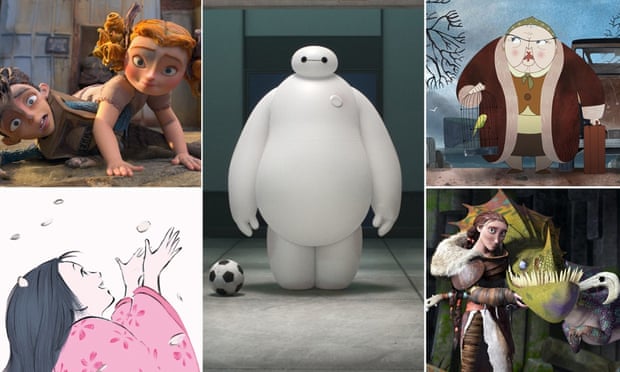
There are those who complain that it’s too easy to score an Oscar nomination for best animated feature. They’re essentially right: current Academy rules state that at least 16 feature-length animated films must qualify for consideration in any given year for the category to yield five nominees. This year, 20 films did, meaning a full quarter of the titles in play wound up with a nomination. When you consider that 87 submissions for best foreign language film were vying for the same number of slots, or that 323 films qualified for best picture this year, the animated race looks a little soft.
Then again, try telling that to the makers of The Lego Movie. The year’s highest-grossing animated film was also among the year’s most universally acclaimed in any medium. (It cracked the Guardian’s top 10, for starters.) It had been running the table on the precursor award circuit so convincingly that most pundits regarded the Oscar as a done deal. Gasps were heard across Hollywood when, in arguably the biggest shock in the category’s 14-year history, the film failed to score a nomination. The word snub is used too often to describe simple Oscar omissions, but this one felt oddly pointed. Were irreverent directors Phil Lord and Chris Miller being penalised by the Academy’s insular animation branch for their success in the live-action sphere? Was the film’s postmodern blend of art and commerce too distastefully hip for them? Could they simply not bring themselves to vote for something called The Lego Movie? One way or another, the race has lost its pace-setter.
And no one is more delighted about that than the folks at DreamWorks Animation, who now slide by default into the frontrunner position with How to Train Your Dragon 2. In fairness, even before the Oscar nominations were revealed, signs were in place that this safe, attractively crafted, roundly well-liked sequel to the 2010 fantasy smash could be a spoiler in the race: its surprise win at the Golden Globes proved that the appeal of slick traditional storytelling is never to be underestimated with conservative voting groups. With a US gross of $177m, it hasn’t quite matched its predecessor’s success, but it’s still a vastly popular, robustly reviewed choice, while the franchise has generated enough affection that people would like to see it rewarded. The first film was unlucky to come up against Toy Story 3, to date the only sequel to win the Oscar; look for this to become the second.
A few months ago, Big Hero 6 was the big-studio contender most nervously regarded by its rivals: Disney, after all, are the reigning champions, having finally nabbed their first win (not counting Pixar films) in the category with the world-beating phenomenon, Frozen. Yet somehow, despite racking up more than $450m worldwide, the robot-superhero romp is at risk of seeming an afterthought in this race. While Frozen is still a ubiquitous pop-culture fixture 21 months after its release, Big Hero 6 simply hasn’t captured the popular imagination in the same way. (Can anyone who hasn’t seen the film really tell what it’s about?) That may not hurt it as much as you’d think: the film is still sturdy, well-received populist fare, while its canny commercial fusion of the Disney and Marvel brands will net it a lot of corporate-loyalty votes. Still, if any nominee is hindered by its makers’ past glories, it’s this one.
Voters who find the DreamWorks and Disney offerings a little too vanilla have a quirkier mainstream option in The Boxtrolls – the third feature (and third Oscar nominee) from Portland-based stop-motion studio Laika, following Coraline and ParaNorman. With its steampunk styling and flashes of historical allegory, this offbeat, elaborately imagined cautionary tale is perhaps the most divisive contender here. American trade critics trashed the film after its Venice premiere, but it swiftly found more sympathetic admirers – particularly in the UK, where its proportional box office has far outstripped its US numbers. Regard for the film’s craft is high in the animation community; if the final vote were branch-restricted, I’d like its chances more.
But it’s not, and lack of awareness across the wider Academy also puts the final two nominees at a crucial disadvantage. Still, GKIDS, a plucky New York-based distributor of foreign and independent animated films, has established itself as a formidable giant-killer at the nominations stage, regularly sneaking in ahead of glossier megabucks contenders. So it was this year: with The Lego Movie down and out, two gorgeous GKIDS delicacies made the cut. Song of the Sea, Irish animator Tomm Moore’s sumptuous reinterpretation of Celtic selkie mythology, was always a dark horse to be reckoned with: Moore’s last film, the lovely The Secret of Kells, was a shock nominee (GKIDS’ first, in fact) in the category five years ago. His latest is even better – an inventively hand-drawn, culturally rich fairytale, it deserves better than fifth place.
But if either of the arthouse Davids can make a lunge at the American Goliaths – and that’s a big if – it’s more likely to be The Tale of the Princess Kaguya, which has sentimental appeal to match its artistry. The presumed swansong of Studio Ghibli, and the first film in 14 years from 79-year-old master Isao Takahata (Grave of the Fireflies), the film offers voters a second consecutive opportunity to give the cherished Japanese animation house a suitably respectful send-off. (Hayao Miyazaki’s farewell feature The Wind Rises lost out to Frozen last year.) Critics have clustered around Takahata’s film since Cannes, while the Los Angeles Film Critics’ Association handed it their win. It’s by no means quintessential Ghibli: a melancholy adaptation of a 10th-century folk tale, rendered in stylised ink-and-watercolour strokes, it’s a world away from the florid fantasy of Spirited Away (Ghibli’s only Oscar winner to date), but scarcely less exquisite.